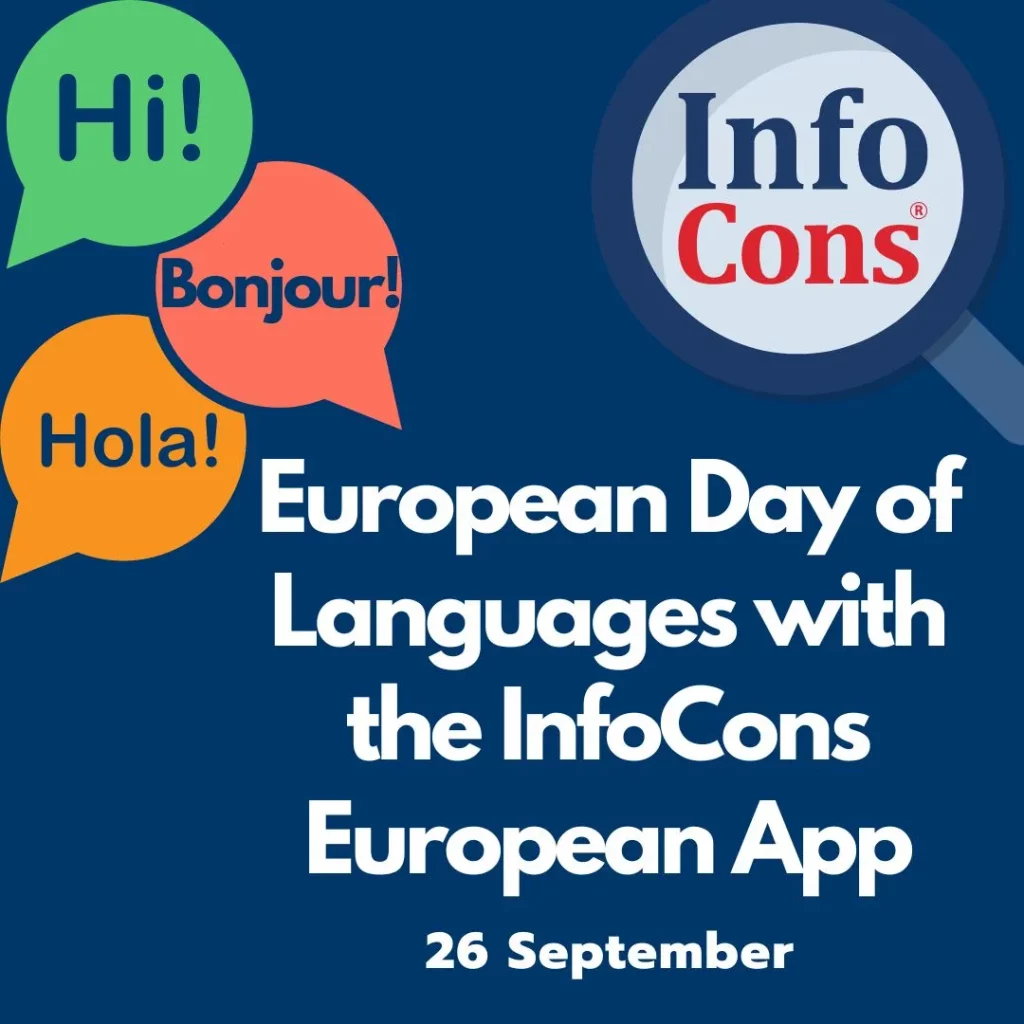
Today, September 26th, is the European Day of Languages. The purpose of this day is to raise public awareness about the importance of learning languages and preserving Europe’s linguistic heritage. In 2024, the theme of the European Day of Languages is “Languages for Peace,” chosen to highlight the important role languages play in building bridges of peace and unity.
On the occasion of the European Day of Languages, InfoCons informs European consumers about the European InfoCons App . This unique platform supports citizens traveling across different countries, whether for tourism, work, or education, by providing useful information to help them make informed decisions.
Read also : EUIPO and the European Commission have launched intellectual property training for influencers
The app is a useful and free tool, available in 33 languages: Romanian , English , Ukrainian , Turkish , French , Hungarian , Greek , German , Spanish , Italian , Albanian , Catalan , Bulgarian , Croatian , Czech , Danish , Estonian , Finnish , Icelandic , Irish , Latvian , Macedonian , Faroese , Greenlandic , Luxembourgish , Serbian , Dutch , Norwegian , Polish , Portuguese , Russian , Slovak , Swedish , the official languages of the European Union, and the languages of minority communities within the EU.
The app can be downloaded from the following stores : App Store, Google Play, and App Gallery. If you encounter any issues during your travels within the European Union, InfoCons provides all consumers with the SOS section within the European InfoCons App .
With just a simple click, consumers have access to all international emergency numbers. The SOS section of the European InfoCons App can also be used offline, allowing emergency numbers to be called directly from the app without an internet connection.
European consumers can also use the European InfoCons App to check all food and non-food product alerts in the country they are in! For food safety alerts, which are updated daily, the level of risk is indicated as low, undetermined, or serious.
Read also : Expert Q&A : Talking with PhD Associate Professor Florin Grama about the Impact of Ultra-Processed Foods on Health
In the Alerts section of the app, consumers can also find out which products have been identified by the European alert system as counterfeit. Through the European InfoCons App , consumers have direct and transparent access to non-food product alerts, updated daily with details such as:
- Product name;
- Country affected;
- Risk level;
- Product origin;
- Date when the alert goes into effect;
- Image of the product subject to the alert.
Through the SOS section of the European InfoCons App , authorities in the country where the consumer is located can be contacted, including consumer protection agencies, police, firefighters, ambulance services, and more.
Using the European InfoCons App , consumers can access a wide range of other useful information in the selected language, including:
- Scanning product barcodes to learn about ingredients , the number and type of food additives , allergens , and the amount of sugar , salt , and calories ;
- Scanning QR codes on energy labels of appliances and other electronic devices ;
- Customizing the app for those with certain health issues and special dietary needs by setting limits for salt, sugar, allergens, and specific types and numbers of additives ;
- A terminology dictionary in consumer protection , environment, banking and finance, labor, insurance, energy, etc.;
- 3 free personalized QR codes through which the scanning traffic of the generated QR codes can be monitored and more.
Read also : The Dangers of Electronic Cigarettes (Vaping) for Adolescents: A Public Health Alarm
The European Day of Languages serves as a platform to highlight the region’s rich linguistic diversity, encouraging cultural appreciation and multilingualism. One of its main goals is to inspire people of all ages to learn new languages and to promote careers in translation, interpretation, and other language-related fields.
The initiative for the European Day of Languages began in 2001 during the European Year of Languages, after which the Council of Europe’s Committee of Ministers decided to make it an annual event. Since then, millions of people from member states and beyond have participated in activities emphasizing the value of linguistic diversity. These efforts aim to protect and promote Europe‘s unique linguistic and cultural fabric, ensuring that people continue to learn and engage with a wide range of languages throughout their lives.
Each year, the European Day of Languages draws attention to the vast linguistic landscape of Europe, which includes over 225 native languages, along with many others introduced through migration. This celebration not only honors widely spoken languages but also shines a light on lesser-known and migrant languages, recognizing them as valuable parts of Europe’s cultural identity. The European Day of Languages underscores the importance of multilingualism as a way to improve intercultural understanding and maintain peace.
Read also : How to Protect Your Personal Data on Your Phone
InfoCons – European Organization for Consumer Protection and Promotion of Programs and Strategies , a full member of the World Organization Consumers International , founding member of the Federation of Consumer Associations , and member of ANEC .